Question
-------------------------------------------
The text above is a follow-up to ...
-----Question-----
Hi, Kate. Thanks for posting!
What I believe you are describing are not parasites on your birds. They are seed moths. These are the same type of moths you might find in old baking flour or old dry cereals that have sat on the shelf too long. Almost all grain products have these insects, although you may never see them (you actually probably eat them daily but would never know). They are probably hatching from the seed you are buying for your birds. They won't hurt your birds at all. Therefore, no need to treat your birds for parasites! Parrots don't normally get worms unless they are in regular contact with the ground outside.
Here's some more information on them:
http://www.pestproducts.com/grain_moths.htm
The moth grubs are likely hatching out somewhere in the seed or in the cage and moving into the water dish for water. Again, they won't hurt your birds. In fact, your birds might eat them! Search on the internet or at your local pet shop for products you can buy to help control them. When I've had these pests in the past, I've used fly strips to get rid of them. You might want to shop elsewhere for your seed, as this seed is obviously old. It also often helps to keep unused seed in the freezer...the cold kills the moths.
Chrys
WOW, such a prompt and detailed response, thx so much! Any ideas on how I could get my birds to mate? I have raised orphaned/runt chicks of many different wild species over the yrs and I would LOVE to handfeed and raise parakeet chics. My pair seem happy enough together, the female being the dominate of the two. I've seen "Aries" try to hop on top of "Blue Belle" a few times but she gets very upset and wont let him! Are there special requirements other than the nesting box , plentiful food, nesting materials? BTW, what is the best nesting material? Someone suggested adding flaxseed oil to the seed mix would help accelerate the females estrus levels(your thoughts?), but I have no clue how to combine them or in what ratio would be sufficent? I want babies so bad! I love my birdies, but they aren't very tame. They will let me get them in and out of the cage and thats about it and no one else can even get that close to them!(clearly not hand raised) Everytime I have to clip their nails and wings I have to use a washcloth to keep from being bitten to pieces, just around the head and body, NEVER covering their little face entirely, but it traumatizes them, & me too,so much, I hate doing it and put it off as long as possible, any advise there? Sorry to keep pestering you, but you really seem to know your stuff and I do sincerely appreciate it, Thx again! Ever Grateful, Kate
-----Answer-----
Hi again, Kate.
How old are your keets? Are you sure you have a male/female pair? Are they pair-bonded, i.e., does the male feed the female beak-to-beak? What size cage do you have these birds in? Any other birds in the home? Your statement that "she gets very upset and won't let him" tells me these birds may not be pair-bonded. Thus, this is most likely why they aren't mating...need more details about what's going on.
You do not need to put nesting material in their nesting box. Some keets won't even go in their nesting boxes with nesting material in it.
I've never heard of adding flaxseed oil to seed mix, but there are vitamins, etc., out there that claim to help speed breeding along...I don't believe in most of these claims.
If you're keets are on an all-seed diet, the first thing I recommend is you change them to a healthier diet. Seed is high in fat, low in nutritional value. They'll need to be on a healthier diet in preparation for breeding and babies.
Birds prefer other birds to humans. Therefore, it doesn't surprise me your birds aren't tame. They most likely weren't handfed as babies...you probably bought untame birds to begin with. Also, most birds are either breeders or pets...often difficult to have both in the same birds.
I can't offer any additional advise on the nail/wing clipping. What you experience is the normal case, even with tame birds! No birds like to be restrained...it's just something we have to do.
Visit my website if you'd like for additional information:
www.angelfire.com/falcon/birdinfo/index.html
Another good site is: www.birdchannel.com
Come back with any additional questions.
Chrys
Thanks Again Chrys,
My keets are at least 2 yrs old but, I had to replace my first female who got lose and flew away. Maybe thats a factor b/c Aries lost his first cagemate and yes they were very bonded. He even seemed mourn and miss Lily as much as I did(do!). Then I got Blue Belle, whom I SWEAR had a purplish brownish cere to begin with(female)... now the cere looks very violet purple... they cant swap sex can they? Surely not! Anyhow b/c of the color change I am begining to think Blue may actually be male! Aries and Blue play kissy face but I dont think they feed each other if anything they fuss over food, would males feed each other or is that strictly a male/female thing? I'm obviously thinking of getting another bird, a definate Female, at least a 1yr old. I realize I will most likely have to put Aries in the smaller cage I have and pair up Blue with the new female in the larger cage together if I want them to mate. BTW I have offered my birds cut up bits of fruits, bananas, berries, citrus, kiwis, apples, cherries, melon and they dont even seem interested. I thought they would love fresh fruits... am I doing something wrong? I placed it on a small saucer and the birds dont even approach it, are they scared by the foreign saucer maybe? I'll just keep trying. Thanks for the other sites for info, I'll definately check them out and stop bothering you.Thx again, Kate
AnswerHi again, Kate.
No, they can't change sex! However, if the cere is changing color, are you sure your birds are as old as you think? A female's cere will change to a crusty looking dark brown when she's in breeding condition, but the overall color shouldn't change in a bird who is at least 2 years old. Males won't feed each other beak-to-beak UNLESS one is unable to feed or care for itself for some reason, and even then, it's rare to see another male care for another male (unless the bird being fed is a baby).
Birds won't eat food they don't recognize, so you have to keep offering the food every day until they eventually try it. They don't know if what you are offering is food, toys, something that will harm them, etc., so they are very leary at first. Also, I haven't found my keets to like many fruits. Try veggies and other, such as cooked brown rice with veggies mixed in, they love corn bread and other types of whole/multi grain breads, dry sugarless nutritional cereals...more details on my website. It could also be the saucer if they are not used to eating from a saucer. Offer the foods in the types of food dishes they are used to eating from. Just keep offering a variety of healthy, nutritious foods every day...eventually one will try it and the others will follow.
I don't want to offend you, but you need to learn a lot more about keets before you allow your birds to breed. There's so many things you need to learn because lots of things can go wrong during the entire process of breeding, raising babies, etc., etc., and you need to know how to handle these situations or your birds will suffer (and any babies they might have).
Chrys

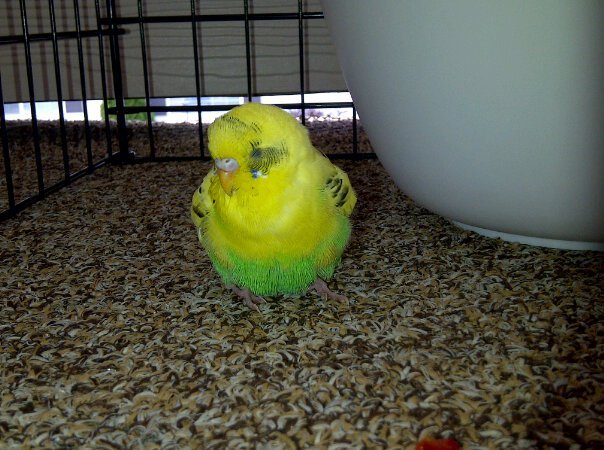 I found a baby Budgie
Question
Baby Budgie
Yesterday I found a little parakee
I found a baby Budgie
Question
Baby Budgie
Yesterday I found a little parakee
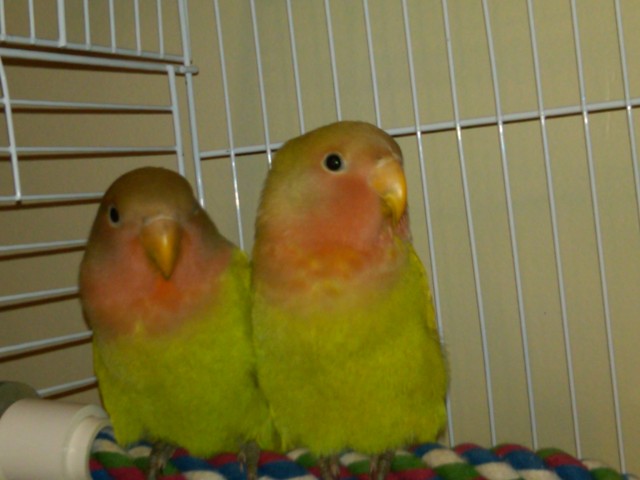 discolored beak
Question
lovebirds beaks
To Whom it may concern:
We re
discolored beak
Question
lovebirds beaks
To Whom it may concern:
We re
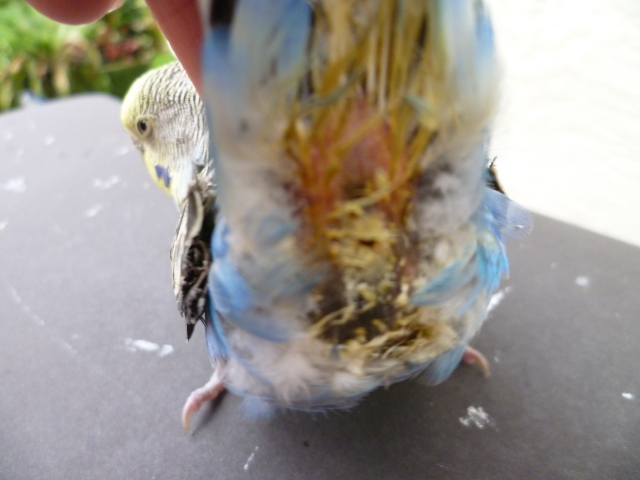 Healthy Budgie??!!
Question
My female birds vent.
Is my female parakeet he
Healthy Budgie??!!
Question
My female birds vent.
Is my female parakeet he
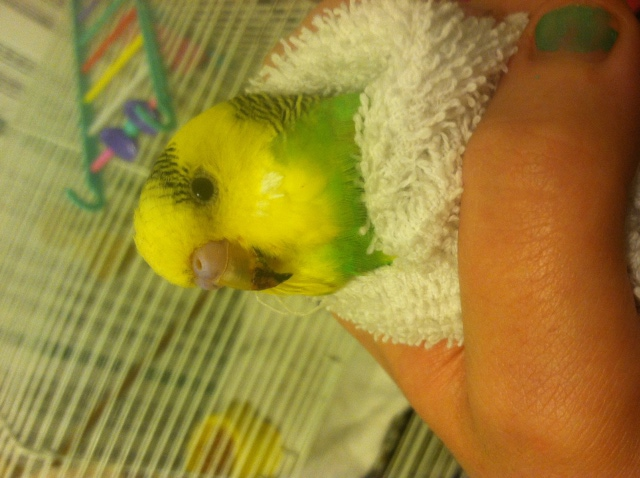 Flakey beak and discoloration
Question
Beak
Hi I have two parakeets. One is no
Flakey beak and discoloration
Question
Beak
Hi I have two parakeets. One is no
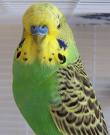 cant tell the sex of my budgier
QuestionQUESTION: Hi! I have 2 new budgies (given as a
cant tell the sex of my budgier
QuestionQUESTION: Hi! I have 2 new budgies (given as a